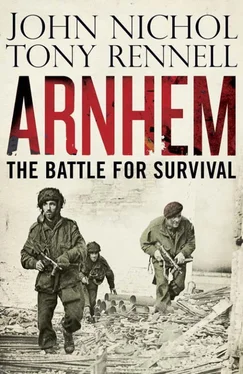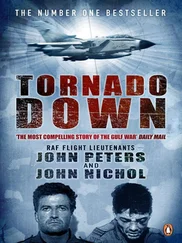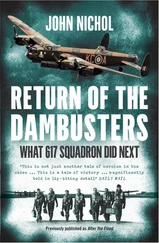But so too were the evaders, and every one of them had an incredible story to tell. The first to get home was Major Eric Mackay, who had fought so determinedly to hold the school building at the Arnhem bridge until forced to surrender. His escape was surprisingly easy, even though it was from inside Germany. His captors had quickly spirited him away with the remnants of his company to a transit camp south-east of Arnhem and just over the border in the town of Emmrich. He dropped out of a window and on to a street. With three others, he hiked back over the Dutch border and made for the Rhine, where they stole a small boat. ‘It had no rudder and just one oar but once we got into mid stream there was a good current running.’ They came to the major fork in the river, where the right channel became the Lower Rhine and flowed towards Arnhem and the left-hand one was the Waal and would take them to Nijmegen. The river was so wide here they almost got lost as well as nearly run down by a massive barge. Then Mackay saw the familiar shape of a large bridge ahead. Was it Arnhem? Had they taken a wrong turn and been swept back to where they started? To his relief, it was the Nijmegen bridge they were approaching, all too recently secured by the Allies. He heard a voice say, ‘Halt! Who goes there?’ and he knew he had made it. He had been so quick he was back behind his own lines even before the evacuation from Oosterbeek was ordered, let alone carried out.
For others, however, getting home was proving much harder. Major Tony Hibbert, another of the heroes of the fighting at the bridge, had been captured hiding in a coal shed in the wreckage of Arnhem and was on board an open 3-tonner lorry and en route to Germany when he grabbed his chance to escape. ‘There were thirty of us, mostly officers, crammed in with two old Luftwaffe guards armed with pistols and rifles. There was a third guard with a Schmeisser sitting on the front mudguard. We continued giving V-signs to the Dutch as well as the odd German, and every time we did this the corporal on the mudguard lost his temper and stopped the lorry to tell us he’d shoot us if we did it again. But we carried on, because every time we stopped it took some time for the lorry to build up speed again. That was our opportunity.’ He jumped over the side. ‘I hit the road hard and there was lots of blood, but nothing seemed broken.’
There was pandemonium. A fellow escaper was downed by the corporal’s machine gun as he climbed over a wall, but Hibbert had luck on his side and was away. ‘I made a dash for the nearest side-turning, zigzagging to avoid the bullets, and crashed straight through a wooden fence. Then I zipped through half a dozen gardens and decided to go to ground. I covered myself with logs in a small garden hut and listened to the weapons still firing in the streets and the shouts of the search party.’ He would discover much later that his escape had been costly. ‘The corporal with the Schmeisser had completely lost his head and turned his gun on the back of the lorry, killing Tony Cotterill [a British war reporter] and another, and wounding eight more. He was threatening to kill the others when a German officer who was passing managed to get matters under control. It’s something that’s been very much on my conscience ever since.’
Unaware of these developments at the time, Hibbert waited until it was dark and headed away from the town and into the countryside, planning to seek help. ‘After I’d gone 2 or 3 miles I found a small, isolated farmhouse. I pulled hard at the bell and tapped on the window, and eventually a very suspicious man stuck his head out and shone a torch on me. I was wearing a groundsheet and my face was covered in blood and bruises, so the glimpse he’d had of me can’t have been very reassuring. It soon became clear he wasn’t going to let me in, and I left. I was told later that he thought I was a German deserter. When he heard the next day that I was a bona fide Englishman he burst into tears and spent the rest of the day bicycling about looking for me.’ But, through another farmer, the major did make contact with the Underground and was sheltered for three weeks with a family in the town of Ede. He discovered he was one of numerous escapers in the area, including half a dozen officers of his brigade. ‘We formed a new Brigade headquarters in a butcher’s shop in Ede. Every morning, dressed in an odd assortment of civilian clothes, we met in the back room to prepare plans for a mass escape.’
Among those officers was Brigadier Lathbury, commander of 1 Parachute Brigade, who had slipped away from the St Elizabeth Hospital to avoid being sent to Germany. After a miserable time spent ‘skulking’ in a hut in the woods, he’d fallen on his feet when he was secretly billeted in the large country house belonging to a ‘most charming’ countess. She and her husband had no fewer than sixty refugees in and around their country pile. But no one could tell the brigadier what was happening with the fighting, though he had a bad (and correct) feeling that the bridgehead at Oosterbeek had been abandoned. There were rumours (also correct) that the focus of the main Allied thrust had shifted away from Arnhem. If that was the case, then a quick sortie to escape over the river would not be possible. ‘It began to look as though we might have to wait here for weeks, possibly until our own troops arrived.’ (The latter was wishful thinking, though a lot of the evaders believed it.) Another strong rumour was that the Germans, who were already rounding up any young people they could find for war work, were going to evacuate all the villages. There was a lot to worry about.
But, amid the tension and the boredom and the constant fear of discovery, at least there was the consolation of comrades in the area, all biding their time while plans were hatched to get them home. Lathbury was moved again, this time by car and with a fellow officer he knew. ‘We had bandages put round our heads and liberally sprinkled with red ink. We passed several parties of Germans marching alongside the road, but there was no other traffic. The driver said the only danger was our Typhoons and I was relieved when the journey came to an end.’ He was now in Ede, where he could link up with more senior men on the run for those meetings in the butcher’s shop. Here it was safe enough to walk the streets, albeit discreetly, although fellow evader Digby Tatham-Warter – the major who had flamboyantly strolled around Arnhem at the height of the fighting with an umbrella – was so bold as to offer his services to help push a German staff car out of a ditch. Tatham-Warter was liaising with the Resistance and moving between pockets of hidden British soldiers to keep them informed on plans to escape.
The weeks were slipping by. Lathbury thought there might be a chance of a Lysander sneaking in to fly him and other ranking officers whose experience might be useful back at Division headquarters out, but this never happened. And time could well be running out. ‘Germans are taking over houses here and there is a fear of evacuation hanging over us. We are told that at Amersfoort and Apeldoorn the Germans have started a reign of terror – making all men between seventeen and fifty dig defences and shooting objectors. I hope to God that doesn’t happen here.’ But an escape plan was cooking – codename Pegasus – whose secret ingredient was a private telephone line belonging to a Dutch electricity company which, unbeknownst to the Germans, ran alongside the power cable and linked directly to Nijmegen. The escape committee could speak directly to Second Army headquarters to plan a route down to the river, where boats would be ready. In all, there were 130 men waiting. ‘We were determined to go out as a fighting patrol,’ Hibbert recalled, ‘and arranged over this telephone line to have weapons and uniforms parachuted to us near Ede.’
Читать дальше












